The classic literary ghost has certain well-defined characteristics: he or she was once a specific human who died in some particularly traumatic way. Stripped of flesh, the ghost has nothing left but psychological compulsion, whether to reenact the trauma, to communicate what happened, or simply to terrorize the living in revenge. Such ghosts are often visible as a hazy form in antiquated clothing, and their touch may be sensed by living skin, but they don’t have much in the way of corporeality.
Any trope so comfortably established invites departures; if we know what our ghosts ought to be, why not explore what they can become? We know that ghosts can sit on the beds of sleeping children, watching them with shadowed eyes, but how else might they relate to the living? What if the compulsions they enact are not their own, but ours, or if the trauma they carry is not the singular grief of one heartbroken person, but something more encompassing? When I started writing When I Cast Your Shadow, which features its own alternative ghosts—who can only access our world by possessing the living, and who don’t retain any definite form, beyond what the living project onto them—my long interest in the manifold forms hauntings can take became acute.
The Haunting of Hill House by Shirley Jackson
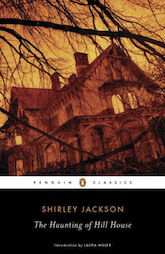 The ghost as psychological parasite.
The ghost as psychological parasite.
Dr. Montague introduces his guests to Hill House with the suggestion that “some houses are born bad.” While a classic assortment of suicides, derangements, and tragic deaths are associated with Hill House, the first one occurs before it’s even inhabited, when the young Mrs. Crain’s carriage overturns before she can move in. The house appears to be haunted, not by the dead, but by intrinsic evil, and it seduces the shy newcomer Eleanor as if it were a venomous lover. At first she finds a sense of unwonted belonging, and a vivid new version of herself, with her companions there. Then the house begins to feed on her vulnerabilities and resentments, invading her mind as a ravenous parasite bent on extracting all it can from its host.
We Were Liars by E. Lockhart
 Ghosts as repressed memory.
Ghosts as repressed memory.
Ghosts often express a trauma that circles back, that insists on making itself known to the living—but that trauma usually belongs to the ghosts themselves, and not to those they haunt. In a striking shift, the ghosts of We Were Liars, while hardly content with their fate, have accepted the horror that killed them with surprising grace and resignation. It is their surviving friend, Cadence Sinclair, who has repressed all memory of the trauma she unleashed. The ghosts, with a decidedly unghostly gentleness, lead her to a confrontation with the past they all share.
The Walls Around Us by Nova Ren Suma
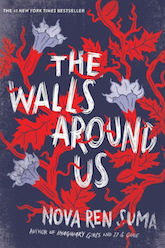 Ghosts as agents of judgment.
Ghosts as agents of judgment.
It’s common for ghosts to serve as a sort of externalized conscience and wreak vengeance on the guilty, but it’s far less usual for them to form packs and hunt down a wrongdoer on behalf of an injured friend. The ghosts of The Walls Around Us, the inmates of a girls’ detention center who died in a mass poisoning, might seem to be classic specters at first glance. But in their shared rage against the sociopathic Violet and her betrayal of their compatriot Ori, they become manifestations of a collective outrage which is very unlike the personal, single-minded vindictiveness of traditional ghosts. And their ability to reverse injustice, even to the point of trading death for life, dramatically expands the power of hauntings to set the world to rights.
The Little Stranger by Sarah Waters
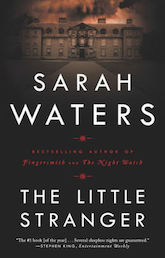 A ghost of the living.
A ghost of the living.
What if looking to the dead for the source of a ghostly disturbance is a mistake, and we’re actually haunted by the stifled envy and malice of the living? Poltergeists are often symptomatic of psychological unrest and are associated especially with adolescent girls, alive and acting out their disturbed emotions through unconscious, telekinetic violence. The vicious poltergeist of The Little Stranger emerges from a grown man. He hounds the Ayres family he both fetishizes and hates, going to the extreme of impersonating the ghost of a dead child the better to torment them. The Ayreses are at the mercy of a toxic brew of sadism and class resentment, while the man behind their haunting remains blithely oblivious to his own cruelty.
Beloved by Toni Morrison
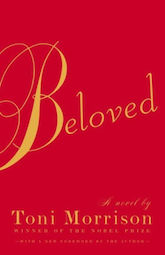 The ghost as embodied mass trauma.
The ghost as embodied mass trauma.
The most visionary of ghost stories suggests that individual tragedies may not be self-contained, but instead express an immense and devastating communal inheritance channeled through personal grief. After Sethe kills her two-year-old daughter to save the child from being returned to slavery, Beloved first manifests as a fairly classic poltergeist, venting her rage against her family. Later, though, she comes to Sethe as something much greater. Incarnate in the dewy, teenaged beauty that should have been hers, Beloved enacts infantile hunger, love, longing, and destructiveness. But behind her tantrums, Beloved keeps the secret of memories that she cannot communicate. She is not just the ghost of one little girl, but also the ghost of the Middle Passage’s uncountable victims. The trauma of her early death cannot be separated from the larger traumas of slavery. History haunts Beloved’s family through her; it returns embodied in a girl delicate, violent, and infinitely sad.
Top Image: The Haunting of Hill House (1963)
 Sarah Porter is the author of several dark fantasy novels for young adults, including When I Cast Your Shadow and Vassa in the Night, and one middle grade sci-fi novel, Tentacle and Wing. She lives in Brooklyn with her husband and two cats.
Sarah Porter is the author of several dark fantasy novels for young adults, including When I Cast Your Shadow and Vassa in the Night, and one middle grade sci-fi novel, Tentacle and Wing. She lives in Brooklyn with her husband and two cats.










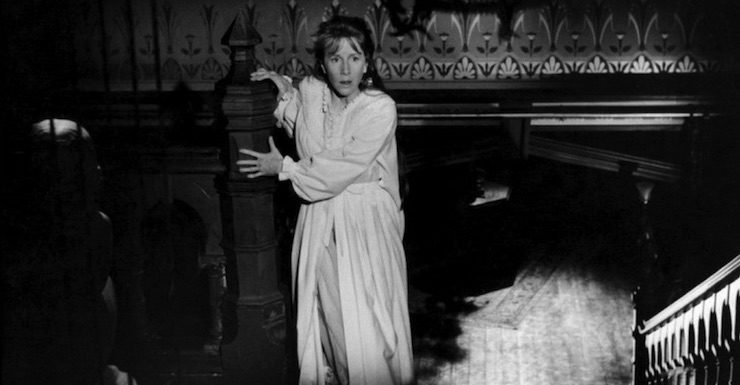
Including We Were Liars on this list is a bit of a spoiler isn’t it?
Yeah… one of the reasons I don’t like to delve too deeply in the roots of The Little Stranger‘s haunting is the political message it seems to be conveying “Oh, the poor minor gentry, crumbling under the heel of SSSSOCIALISSSMM and the vicious attacks of a jealous working-class upstart! The sign of times!” I liked the novel too much to let that sour my memory of it.
One of the best ghost stories I’ve ever read is “Sparrow Hill Road” by Seanan McGuire. It tells the story of the Phantom Prom Date, the Girl in the Green Silk Dress, the Hitchhiker of Route 42 in her own words and her own voice. It is a vivid, gritty, modern ghost story. The first lines of the book inform the reader that “linear” is a word for the living, and true to form, the book is not told chronologically. But it never loses its way as it pieces together the story of the hitchhiking ghost Rose Marshall and her final confrontation with Bobby Cross, the damned horror that ran her off if Sparrow Hill Road one spring night in 1952.